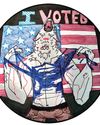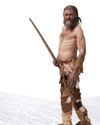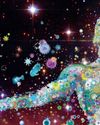In 2012, a Japanese mathematician named Shinichi Mochizuki announced that he finally knew the abc’s.

He wasn’t talking about the Roman alphabet—he has known English for most of his life. He was talking about a mathematical statement called the abc conjecture. (In mathematics, a conjecture is a statement that some mathematicians believe to be true but no one has proved for certain. When it is proved for sure, it is called a theorem.)
Mochizuki studies number theory, a branch of mathematics. Mathematics is an incredibly broad, diverse subject. Mathematicians study everything from the random way stock markets and electrons seem to move to the properties of exotic shapes in unimaginable dimensions. But if you ask someone on the street what a mathematician does, the guess will probably be closest to what a number theorist does. They study the properties of numbers, especially the positive whole numbers: 1,2,3, and so on.
Connecting Multiplication and Addition
Number theorists do a lot more than count, though. They try to understand relationships between numbers. If you’ve taken algebra, you may have seen an equation that looks something like y =3 x + 4, or even y = mx + b. All those letters indicate variables. The expression y = 3x + 4 represents all the possible pairs of numbers that satisfy that relationship, which ends up looking like a straight line. If you substitute a number, like 2, for x in the first equation, you can find that y = 3 × 2 + 4, or 10.
The abc conjecture connects multiplication and addition: it relates two numbers and their sum to the factors of all three numbers. The conjecture starts innocently enough with what looks like one of the simplest possible equations: a + b = c. Here, the numbers a, b, and c all have to be positive whole numbers, and they can’t have any factors in common. For example, the equation 4 + 11 = 15 would be OK, but 4 + 12 = 16 would not be eligible because all three numbers have a common factor of 4.
Esta historia es de la edición July/August 2018 de Muse Science Magazine for Kids.
Comience su prueba gratuita de Magzter GOLD de 7 días para acceder a miles de historias premium seleccionadas y a más de 9,000 revistas y periódicos.
Ya eres suscriptor ? Conectar
Esta historia es de la edición July/August 2018 de Muse Science Magazine for Kids.
Comience su prueba gratuita de Magzter GOLD de 7 días para acceder a miles de historias premium seleccionadas y a más de 9,000 revistas y periódicos.
Ya eres suscriptor? Conectar

A 12-Year-Old Girl's Election Sticker Is a Winner
VOTING IS A FUNDAMENTAL FREEDOM FOR AMERICANS, A MEANS OF DOING ONE'S CIVIC DUTY AND A WAY AN INDIVIDUAL CAN EXPRESS THEIR VOICE. In 1971, the United States lowered its voting age to 18. But that doesn't mean kids and teens under 18 can't participate in elections in various ways.

If everything the human brain does is basically sets of electrical impulses, how exactly does that translate into a state of mind?
You're not the only one asking this question. Every neuroscientist in the world is wondering the exact same thing, says Zach Mainen

EARTH'S TINIEST BUILDERS
THE HIDDEN WORLD OF MICROBES IN THE EARTH'S CRUST

MUMMIES SPEAK
ABOUT MICROBES, MIGRATION, AND MORE

GOING WITH YOUR GUT
HOW DO MICROBES AFFECT OUR HEALTH? LET'S COUNT THE WAYS...

BUG Detective
A burglar sneaks into a house on a quiet street in New York City. He walks through the house, touching countertops and door handles. Finally, he steals a single card from a full deck. Then he leaves.

Little Creatures Among Us THE MANY MICROBES IN OUR DAILY LIVES
When you think you're alone, you're actually not. In the ground, the air, your room, and even your body are Strillions and trillions of creatures so tiny you can't see them.

A Mars Rock Found With Leopard Spots Could Be a Sign of Ancient Life
IN JULY, NASA'S PERSEVERANCE ROVER CAME ACROSS A SPOTTED ROCK IN WHAT WAS ONCE A RIVERBED IN THE JEZERO CRATER ON MARS.

Para Athlete Uses Exoskeleton Suit to Carry the Olympic Torch
In July, a 36-year-old French tennis para athlete, Kevin Piette, got a chance to participate in this summer’s Olympic torch relay without using a wheelchair.

Ancient Egyptians May Have Used a Water System to Lift Stones to Build Pyramid
HOW ANCIENT EGYPTIANS BUILT THE MASSIVE PYRAMIDS IN EGYPT MORE THAN 4,000 YEARS AGO HAS LONG BEEN A TOPIC OF WONDER AND DEBATE.